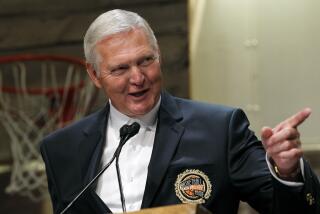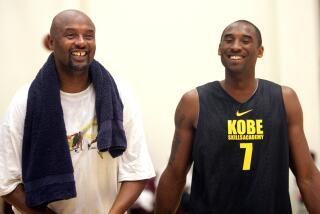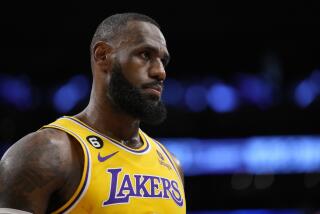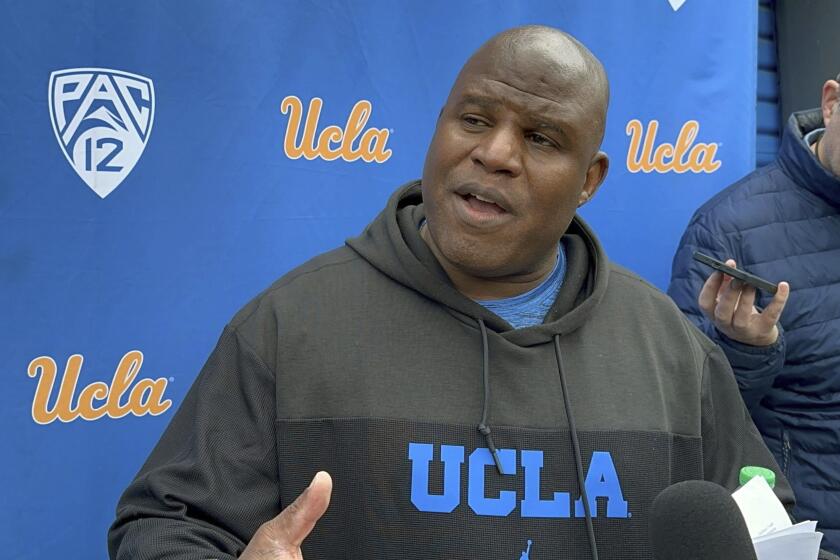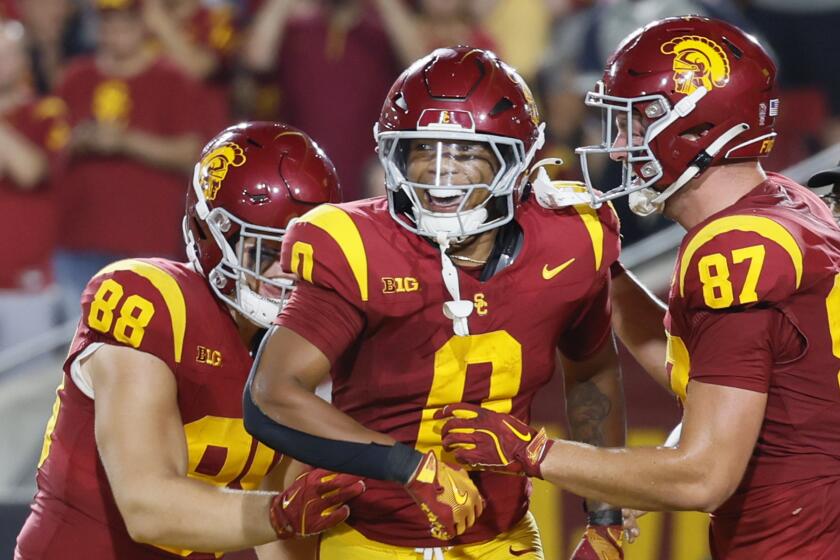Clearing the heir may take time after Lakers owner Jerry Buss’ death
Amid the tributes and condolences, the lingering sorrow over Jerry Buss’ death, now comes the hand-wringing.
Lakers fans see Jim and Jeanie Buss in control — no father keeping watch — and wonder if the kids can uphold a winning legacy.
Jeanie has already won respect with her intelligence and candor, but has previously focused on the business side of the franchise. Will she — as Magic Johnson has advocated — exert more influence on basketball matters?
And what about Jim? The son has been a constant lightning rod for criticism, outsiders guessing at what role he played in controversial decisions such as the hiring of Mike D’Antoni over Phil Jackson. What kind of leader will he be?
This isn’t the first time children have taken over a family business, not even in the rarefied world of professional sports. The challenge facing Jim and Jeanie is familiar, if daunting.
“To inherit this kind of job, it certainly puts you under the microscope,” said Paul Swangard, who studies the business of sport at the University of Oregon. “The question becomes, ‘Does the next generation have the capability?’”
The same thing happened with the New York Yankees, the Pittsburgh Steelers and the Chicago Bears. It happened with the Dodgers.
There is no guarantee of success for an heir ascending to the throne, but there might be a few important checkpoints.
In the case of the Dodgers, Peter O’Malley worked gradually up the ranks.
That meant running Dodgertown in Vero Beach and operating a minor league team in Spokane. It meant serving various roles at Dodger Stadium before taking over for his father, Walter.
If nothing else, this type of background can help combat the perception that rich kids don’t have to earn their way.
“It’s just human nature for that to happen,” said George Belch, a sports marketing professor at San Diego State. “That’s going to become an issue when the team isn’t doing well.”
No one can deny that Jim and Jeanie have paid their dues, both working within the organization for more than a decade.
Jim served as an assistant general manager and is now in his eighth year as executive vice president of player personnel. Jeanie oversaw the now-defunct Los Angeles Strings of World Team Tennis and was president of the Great Western Forum before becoming the Lakers’ executive vice president of business operations.
Jerry Buss saw their experience as essential.
“In the beginning it was largely my effort to maintain the business,” he said in a 2003 interview published in the Kings’ yearbook. “But by the mid-to-late ‘80s, I started to get a lot of help from my bright children.”
The continuity can be beneficial. The same family has operated the Steelers since the team’s formation in 1933. Art Rooney, the founder, died in 1988, giving way to his son, Daniel.
Dan — and his son, Art II, after him — have been credited with sticking to Art’s style of patient, loyal management. This is a team that has employed all of three head coaches in the last four decades.
After the Steelers won the 2006 Super Bowl — the first since Art’s death — Dan said in typically folksy manner: “It’s great to continue a legacy and things like that.”
A similar dynamic has occurred with the San Francisco 49ers, albeit with a twist.
Eddie DeBartolo was forced out as owner after guiding the franchise to five Super Bowl victories. His sister, Denise DeBartolo York, and her husband, John York, then served a stint as widely unpopular owners.
Now their son, Jed York, has taken over. Just as his uncle Eddie once hired an up-and-coming Bill Walsh from Stanford, York plucked Jim Harbaugh from the nearby university and has similarly revived the sagging franchise.
But adhering to an established script is only part of the deal, especially when the new owners follow a legend.
Hank and Hal Steinbrenner have so far fallen short of matching their bombastic and free-spending father, George, in running the Yankees.
Virginia Halas McCaskey faced the difficult task of following her dad, George Halas, as principal owner of the Bears. The team won a Super Bowl in 1985, but in less successful times, McCaskey had to replace her own son, Michael, who was team president.
Even Peter O’Malley, who enjoyed great success with the Dodgers, always seemed to come up short in comparison to his visionary, risk-taking father. As Peter once said, “People do different things in different times.”
Belch puts it a different way.
“In sports or in business, you just have these really visionary people and good leaders,” the professor said. ‘But these people are the exception, not the rule. Not everyone has that Midas touch.”
Which means business acumen is not necessarily passed down through genetics. And offspring have the additional burden of constantly being compared.
“The high-profile nature of the sports business makes it slightly unusual,” said Swangard, who oversees the Warsaw Sports Marketing Center. “Any family member taking the reins of a sports team has to understand it can be like replacing Phil Jackson on the bench or replacing Kobe Bryant on the roster.”
That is especially true for the Buss heirs. Their father set the bar high, bringing 10 NBA titles and a slew of Hall of Fame players to Los Angeles over the course of three decades.
There is only one way to ease fans’ uncertainty. As Belch put it, “Winning makes everything all right.”
Twitter: @LATimesWharton
More to Read
Go beyond the scoreboard
Get the latest on L.A.'s teams in the daily Sports Report newsletter.
You may occasionally receive promotional content from the Los Angeles Times.
